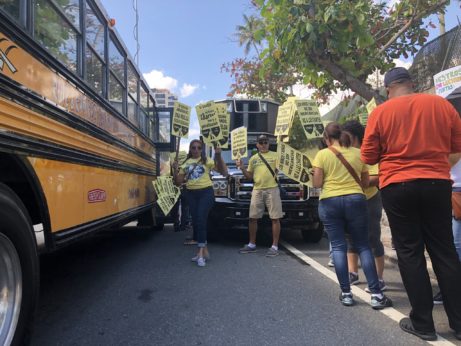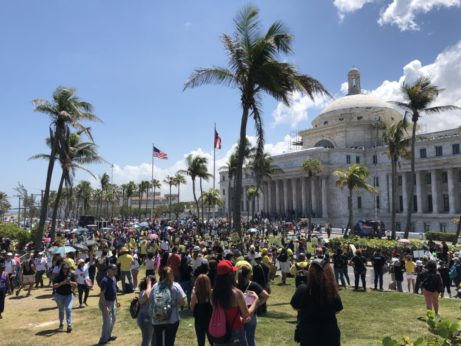
More than 16,000 public school teachers in Puerto Rico walked out of the classrooms and marched to the Capitol in San Juan this Monday (March 19). They strengthened a crescendo of militant actions to demand investment in public education and against private school vouchers and the massive privatization plans of the island’s schools, known as the Charter Laws. The one-day strike was called by a broad coalition of labor, community and education groups (Frente Amplio en Defensa de la Educación Pública [FADEP]), and led by the progressive and anti-colonialist Teachers’ Federation (Federación de Maestros de Puerto Rico).
Last week Puerto Rico’s Legislative Assembly approved bills that now await Governor Ricardo Rosselló’s signature, which would open the public school system to private takeover, much like the takeover of the New Orleans school system after the devastation wrought by Hurricane Katrina. In that city only five schools continue to be run as public entities.
The charter industry, along with the Puerto Rico Secretary of Education Julia Keleher, had lobbied legislators heavily, touting private takeover as the best path forward for Puerto Rican students in the aftermath of Hurricane María six months ago. But the Teachers’ Federation, together with community, parent, and education and public health advocates, have embarked on a campaign to expose the hedge fund and financial interests behind these moves and the danger they pose of dismantling quality public education.

Since mid-February, throughout the island militant shows of strength and determination have been held by these teacher, parent and community groups, along with supportive legislators, to stop the governor’s and charter lobby’s fast-track push for privatization.
Mercedes Martínez Padilla, president of the Federation and a principal leader of the movement to defend public education, said the implementation of the Charter Law “would mean the destruction of our schools. It would immediately privatize 10 percent as a start and open the way for the rest of the school system.” She added that during recent public hearings, medical doctors, teachers, unions, parents and special education workers testified as to the detrimental effects of running the schools as for-profit institutions, accountable to their wealthy investors.
“On the day of the walk-out we received so much encouragement, photos and statements of support from across the United States. A Harlem school donned t-shirts with our logo and cheered us at a sister rally in New York City.”
She also pointed out that the Constitution of Puerto Rico prohibits public funds being used to fund private schools. In 1994, a voucher program was proposed but was struck down by the Supreme Court of Puerto Rico on these grounds.
In response to the attacks on Puerto Rico’s public education system, American Federation of Teachers (AFT) President Randi Weingarten said, “The people of Puerto Rico didn’t cause this crisis, but now they are forced to shoulder most of the burden because of the actions of hedge fund profiteers and irresponsible government deals.”

Over 40,000 teachers in Puerto Rico joined the AFT last year during the financial debt crisis on the island and amidst threats to close hundreds of schools and strip benefits and retirement security from teachers and municipal unions. In 2014 officials passed a law that prohibited salary increases of any kind until 2022. At the same time, in past years, Puerto Rico has sold off public lands and roads to U.S. corporate interests and investors, that have also reaped profits from tax laws that favor wealthy investors. Austerity measures were imposed by a U.S.-appointed board to oversee the debt crisis in Puerto Rico.
“Parents have a lot of power, and they are vehemently opposed to the charter takeover, especially knowing that these schools discriminate in their admissions against students with special needs,” said Martínez Padilla.
Aída Díaz, president of a teachers group which did not participate in the walk-out, but also opposes the Charter Law, pointed out that teacher salaries have not increased in nine years, with the median salary at $19,000. “Rather than treat public education as something to invest in,” she said, the proposed bill treats schools “as a collection of goods and services to be consumed.”
Organizers of the rallies last Monday point to the criminal neglect of the Puerto Rican people’s needs by the GOP Congress and Trump Administration. The rapid move toward budget cuts and privatization underscores the need for opposition voices to be heard through bold actions.
Martínez Padilla emphasized that this walk-out and rally have wide, public support, and the fightback will continue by the people of Puerto Rico.
“The struggle grows stronger, and we will win,” she said.










